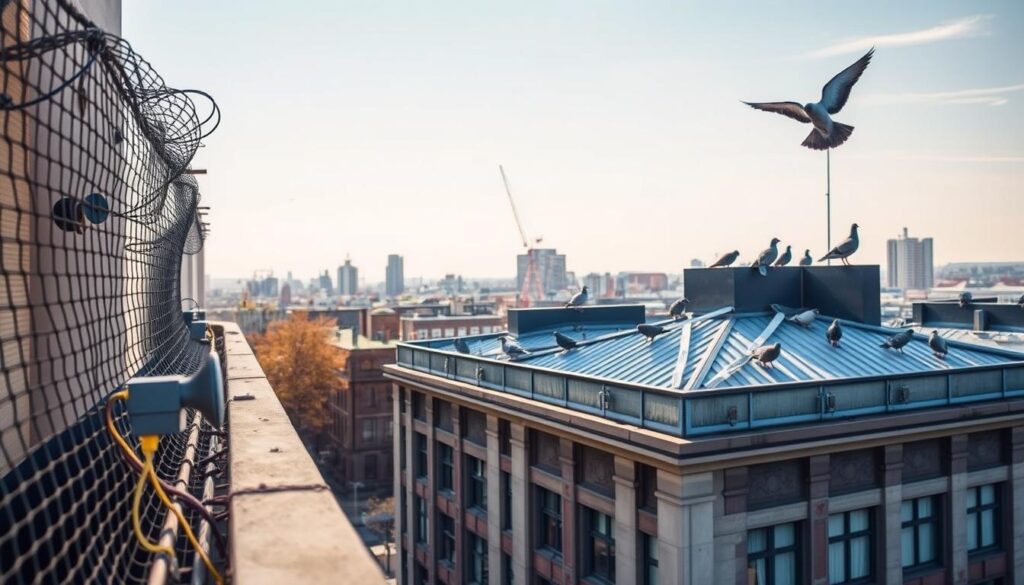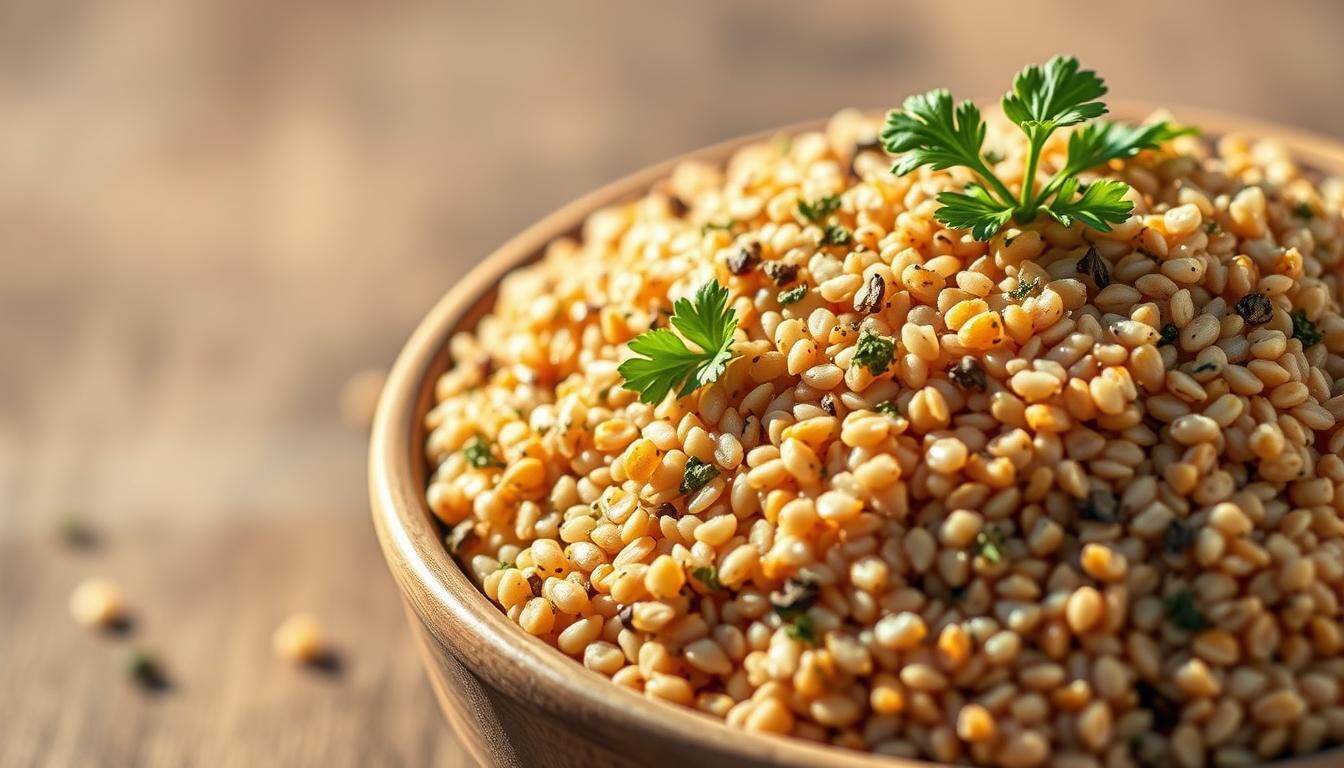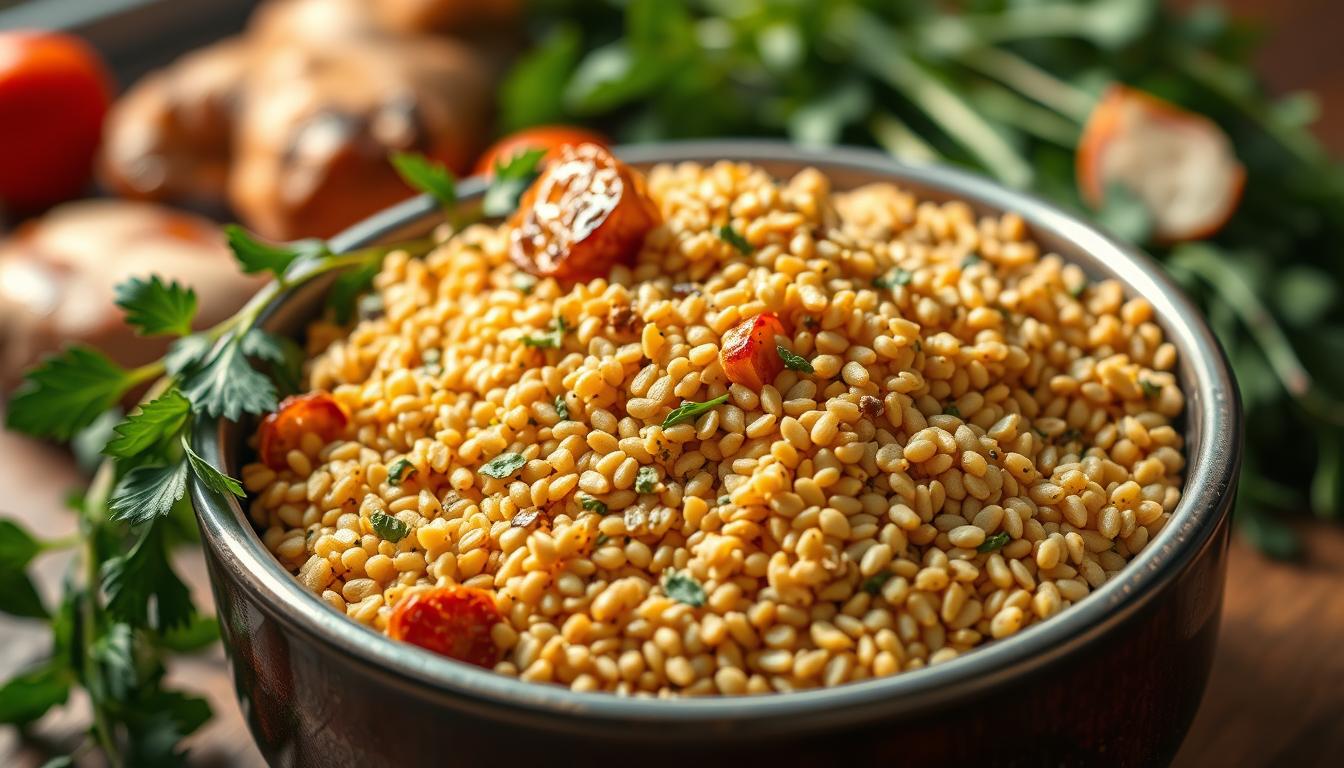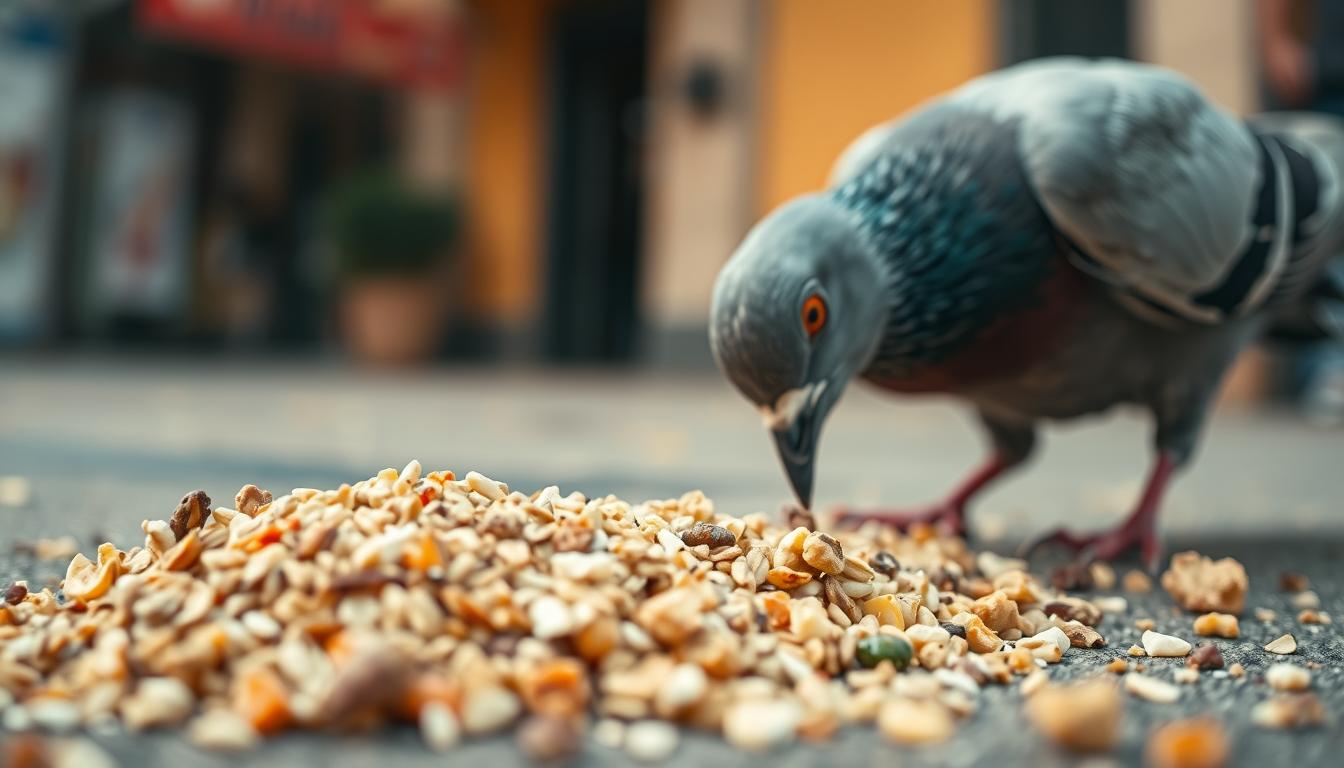Ever woken up to find your patio covered in pigeon mess? You’re not alone. Pigeons can quickly turn your peaceful outdoor space into a mess. It’s not just about keeping it clean—it’s about protecting your property and health.
Pigeon control is key as these birds breed fast. Their droppings are not just ugly—they’re dangerous. Pigeons can carry up to 60 diseases, posing risks to you and your family.
In this guide, we’ll show you how to take back your space from pigeons. These strategies work for homeowners, business owners, and property managers. They’ll help you manage and prevent pigeon problems.
You’ll learn simple DIY tricks and professional solutions to keep pigeons away. Say goodbye to unwanted bird visitors!
Table of Contents
Understanding Why Pigeons Are a Serious Problem
Pigeons might seem harmless, but they can cause big problems for property owners. They are more than just a nuisance. They can harm your health, property, and the environment. Knowing the risks helps you find ways to keep pigeons away and stop them from nesting.
Health Risks and Disease Transmission
Pigeon droppings are not just ugly – they’re dangerous. They can carry serious diseases like:
- Histoplasmosis
- Cryptococcosis
- Psittacosis
Up to 80% of people in the eastern and central U.S. have been exposed to histoplasmosis without knowing. People with weak immune systems or asthma are especially at risk.
Property Damage from Pigeon Activity
Pigeons can damage your property a lot. Their droppings are very acidic and can:
- Corrode building materials
- Create slippery surfaces
- Block gutters and downspouts
- Increase fire risks in chimneys
“Pigeons can generate expensive damage to properties in a short period, necessitating prompt action from property owners.” – US Department of Agriculture Wildlife Services
Reproduction and Population Growth
The biggest problem with pigeons is how fast they reproduce. They can raise a dozen or more young each year and nest all year. In places with plenty of food and space, their numbers can grow fast. This makes controlling pigeon populations very important.
To manage them well, you need to understand their breeding habits. Then, use effective pigeon deterrents to stop them from nesting and control their numbers.
Essential Prevention Methods: How to Keep Pigeons Away
Dealing with pigeons needs a smart plan to keep your place safe. It’s not just one thing, but a mix of ways to keep pigeons away. This includes using different devices and methods to scare them off.
Start by learning and using different ways to stop pigeons. Good pigeon control means looking at their behavior and where they live. Here are some key steps:
- Remove food sources that attract pigeons
- Block potential nesting areas
- Use innovative pigeon repellents
- Create inhospitable environments
Urban areas are perfect for pigeons to live. Cities like New York face big problems with pigeons. But, you can fight back with simple, smart steps.
Important steps to keep pigeons away include:
- Implementing physical barriers
- Using scent-based repellents
- Installing visual deterrents
- Maintaining clean surrounding areas
Natural repellents like essential oils can also help. Oils like peppermint, cinnamon, and lemon make places pigeons don’t like. It’s important to keep changing your methods to keep pigeons guessing.
Remember: Consistent and varied prevention techniques are key to long-term pigeon control success.
Physical Deterrents and Barriers
To keep pigeons away, you need to make your property less inviting. Physical barriers are a top choice for pigeon control. They make it hard for pigeons to land and nest.
Using the right barriers can greatly lower pigeon numbers near your place. These methods make surfaces uncomfortable or impossible for pigeons to use.
Bird Spikes and Wire Systems
Bird spikes are a simple yet effective tool against pigeons. They make surfaces uneven, stopping pigeons from landing. The benefits include:
- Durable stainless steel construction
- Virtually invisible from ground level
- Long-lasting protection against bird intrusion
- Minimal aesthetic impact on building appearance
Netting Solutions
Netting is great for covering large areas. It’s a top choice for pigeon control. It can protect:
- Balconies
- Warehouses
- Rooftop spaces
- Industrial installations
Anti-Roosting Strips
Anti-roosting strips are another good option. They make surfaces uncomfortable for pigeons. They work best when:
- Installed on narrow ledges
- Placed in consistent patterns
- Maintained regularly
- Combined with other deterrent methods
Pro tip: Rotate and combine different physical deterrents to maximize effectiveness and prevent pigeons from adapting to a single method.
Natural Repellents and Smells That Pigeons Hate
Learning about non-toxic ways to keep pigeons away can protect your property. Pigeons rely heavily on their sense of smell. So, certain smells can keep them from your area.
Spices and essential oils are great at keeping pigeons away. Here are some effective natural deterrents:
- Cayenne pepper – Creates an uncomfortable environment for pigeons
- Cinnamon – A strong scent that pigeons despise
- Eucalyptus essential oil
- Peppermint oil
- Garlic powder
Making your own pigeon repellent spray is easy. Just mix water with a few drops of essential oils or sprinkle spices in pigeon hotspots. The strong smells will keep them away.
Keep in mind, these methods need to be used often. Weather and time can weaken their effect. To keep pigeons guessing, switch up your repellents regularly.
Pro tip: Mix different natural deterrents for the best results in keeping pigeons away.
Motion-Activated Devices and Visual Deterrents
To keep pigeons away, you need smart anti-pigeon devices. Motion-activated pigeon deterrents are a great choice. They help keep these birds from your property.
Light-Based Solutions
Visual deterrents can really work against pigeons. Reflective devices create odd light patterns that bother birds. Some good options are:
- Reflective tape that flashes randomly
- Strobe lights that confuse pigeons
- Shiny discs that move with the wind
Automated Sprinkler Systems
Motion-activated sprinklers are a strong defense against pigeons. They detect movement and spray water suddenly. This startles birds without hurting them. The Melnor Jet Spray Motion Sensor Water Sprinkler Repeller works all the time, making a good barrier.
Decoy Predators
Realistic predator decoys can fool pigeons into thinking they’re in danger. Some effective methods are:
- Plastic owl models with moving heads
- Hawk-shaped kites that seem real
- Decoys placed and moved often
For the best pigeon control, use a mix of anti-pigeon devices. This way, you get the best results.
Professional Bird Control Methods

When pigeon control gets too hard, professional bird control services have advanced solutions. They use special knowledge and methods that DIY can’t match.
These experts use many advanced pigeon control strategies:
- Falconry-based bird control
- Large-scale exclusion techniques
- Integrated pest management approaches
- Specialized trapping and relocation services
Businesses and property owners get a lot from professional help, especially in food manufacturing. Experts know local laws and use humane pigeon control methods.
Hiring professionals offers many benefits:
- They assess how bad the problem is
- They create control plans just for you
- They use the latest technology
- They follow wildlife protection laws
Professional services quickly solve big pigeon problems. They use methods that work well and are good for the environment. From ultrasonic repellents to netting, they offer complete solutions to stop pigeon damage.
Remember, getting professional help saves time, money, and health risks from pigeons.
Preventing Pigeons from Nesting on Your Property
To keep pigeons away, you need a smart plan. They look for safe spots to raise their young. Knowing where they nest is key to keeping them off your property.
Pigeons can turn your place into their home fast. They pick spots that keep them safe from harm and bad weather.
Identifying Common Nesting Areas
To stop pigeons from nesting, find out where they like to go:
- Roof eaves and overhangs
- Attic spaces
- Unused chimneys
- Balcony corners
- Ledges and window sills
Blocking Access Points
Sealing off where they can get in is a good start. Here’s how to do it:
- Install mesh screens on potential openings
- Use bird spikes on ledges
- Seal small gaps and cracks
- Remove potential nesting materials
- Maintain regular property inspections
Pigeons breed fast. One pair can have up to six broods a year. So, acting quickly is important. Getting help from pest control pros can help keep pigeons away.
Maintaining a Pigeon-Free Environment

To keep pigeons away, you need to stay active and strategic. Your efforts to control pigeons work best when you’re always on the lookout for them.
It’s important to regularly check your property for pigeons. Experts say you should do this at least every three months. This helps find places where pigeons might nest or get in.
- Inspect roof edges, ledges, and architectural features monthly
- Clean potential roosting areas immediately
- Check for and seal any new access points
- Remove potential food and water sources
Experts in pigeon control recommend a detailed maintenance plan. Using different methods and keeping up with maintenance can cut pigeon numbers by 80% on your property.
Some key strategies for maintenance include:
- Regularly cleaning areas where pigeons might gather
- Replacing worn-out bird deterrent devices
- Monitoring and addressing any new pigeon activity quickly
- Keeping surrounding areas clean and unattractive to birds
Remember, successful pigeon control is an ongoing process that requires patience and consistent effort. By staying proactive and using integrated pest management techniques, you can effectively keep pigeons away from your property long-term.
Common Mistakes to Avoid in Pigeon Control
Many property owners make big mistakes when trying to keep pigeons away. Knowing these errors can help you make a better plan to keep pigeons away without harming them.
Some common mistakes in pigeon control include:
- Relying on a single ineffective method
- Neglecting to remove food sources
- Using harmful chemical repellents
- Inconsistent application of deterrent techniques
One big mistake is not fixing the reasons pigeons are drawn to your place. Food availability is a big draw for these birds. Scaring them off won’t work if there’s still food around.
Homeowners often don’t realize how important it is to use many pigeon deterrents. Just using things like shiny surfaces or fake predators won’t keep pigeons away for long. A good plan uses physical barriers, changes to the environment, and regular upkeep for the best results.
Effective pigeon control requires patience, strategy, and a commitment to humane methods.
Some bad or harmful methods to avoid include:
- Poisoning pigeons
- Using sticky gels that can harm birds
- Implementing sporadic control measures
- Ignoring local wildlife regulations
Remember, keeping pigeons away is about making your place less inviting to them. By understanding their habits and removing things that attract them, you can keep them away for good without hurting them.
Legal Considerations and Humane Control Methods
Understanding local laws is key when dealing with pigeons. Many places have rules about managing wildlife. These rules often ban harmful ways to control pigeons. You should focus on safe and non-toxic methods to protect both your property and the birds.
Using humane bird control means knowing the law. Experts suggest talking to local wildlife authorities before starting any plan. Some cities require certain methods that don’t harm birds but still keep them away. For example, the Ovocontrol program is a safe and legal way to control pigeon populations.
Local Regulations
Every city has its own bird management laws. You need to check your local laws to make sure your methods are allowed. Breaking these laws can lead to big fines and legal trouble. Working with certified wildlife experts ensures your methods are legal.
Ethical Control Practices
Choosing humane pigeon control means picking methods that keep them away without hurting them. Options like ultrasonic repellers, anti-bird spikes, and eco-friendly repellents are good choices. By focusing on safe pigeon control, you protect your property and the environment while following the law.
FAQ
Are pigeons really dangerous to my health?
Yes, pigeons can be harmful to your health. Their droppings carry over 60 diseases, like histoplasmosis and cryptococcosis. These diseases spread through airborne spores in dried droppings, causing serious respiratory issues.
How quickly can pigeons reproduce?
Pigeons breed very quickly. A pair can have up to 6 broods a year, with 2 eggs each. This means a pair can have 24-72 birds a year, making early control important.
What are the most effective physical deterrents for pigeons?
Bird spikes, wire systems, and anti-roosting strips work well. They make surfaces hard for pigeons to land on, stopping them from roosting on your property.
Do natural repellents actually work against pigeons?
Natural repellents can help when used often. Essential oils like peppermint and eucalyptus can deter pigeons. But, they need frequent use and work best with other methods.
When should I consider professional pigeon control services?
Get professional help for a big problem, many nests, or when DIY fails. Experts offer solutions like exclusion techniques and falconry.
Are there legal restrictions on pigeon control methods?
Yes, laws limit bird control. Some methods, like harming birds, are banned. Always check local laws before controlling pigeons.
How can I prevent pigeons from nesting on my property?
Stop pigeons by removing nests and using barriers. Block access, take away food, and keep your property clean to deter them.
What are the most common mistakes in pigeon control?
Mistakes include using bad deterrents and not using them often. Not fixing food issues and using poison are also wrong. A good plan is consistent and humane.
How often should I inspect my property for potential pigeon issues?
Inspect your property every 3 months, more often in breeding seasons. Look for nests, droppings, and entry points. Quick action stops big problems.
Are there any non-toxic methods to keep pigeons away?
Yes, there are safe ways to keep pigeons away. Use motion-activated sprinklers, decoy predators, and reflective surfaces. Essential oil sprays and bird spikes also work well.
Source Links
- How To Stop Birds From Nesting Around Your Home – https://www.familyhandyman.com/article/how-to-stop-birds-from-nesting-around-your-home/?srsltid=AfmBOorpbFUdLklqseSuGr8C_7oEbhwZn-l_I1VLNOAYAjAj-MfG8oXP
- Prevent Pigeons from Perching – Rosie On The House – https://rosieonthehouse.com/blog/prevent-pigeons-from-perching/
- What to do about pigeons – https://www.humaneworld.org/en/resources/what-do-about-pigeons
- How to Get Rid of Pigeons: A Complete Guide [2025] – Smith’s Pest Management – https://smithspestmanagement.com/blog/post/how-to-get-rid-of-pigeons/
- Strategies to Get Rid of Pigeons at Your Home – https://animalcontrol.nyc/strategies-to-get-rid-of-pigeons-at-your-home/
- Bird Control Guide: How to get rid of pigeons? – https://www.nomorebirds.co.nz/how-to-get-rid-of-pigeons/?srsltid=AfmBOoq2hveO_SbjwPx671uPnr1795TAMBcJCq54ze8aVqRGM-sZ77mr
- How to Get Rid of Pigeons: 10 Best Solutions for You – https://www.ichase.io/blog/how-to-get-rid-of-pigeons
- Pest experts reveal how to keep pigeons out of your garden without causing harm – https://www.womanandhome.com/homes/how-to-keep-pigeons-out-of-your-garden/
- How to Keep Pigeons Away? A Complete Solutions Guide for 2024 – https://hicare.in/blog/how-to-keep-pigeons-away/
- Top 20 Home Remedies to Get Rid of Pigeons Naturally and Fast – https://hicare.in/blog/home-remedies-to-get-rid-of-pigeons-naturally/
- How To Get Rid Of Pigeons: A Complete Guide – https://aviancontrolinc.com/get-rid-of-pigeons/
- How to Keep Pigeons Away – Today’s Homeowner – https://todayshomeowner.com/pest-control/guides/how-to-keep-pigeons-away/
- 12 Top Bird Deterrents Of 2024: A Review & Comparison Guide – https://worldbirds.com/bird-deterrent/
- Bird Control Guide: How to get rid of pigeons? – https://www.nomorebirds.co.nz/how-to-get-rid-of-pigeons/?srsltid=AfmBOoqlgthmNVFmd–7S63O6Vgs8MWGg9JWB8YefPVdpLY0ltX_XdSk
- How To Get Rid Of Pigeons | Pigeon Control | Pest Solutions – https://www.pestsolutions.co.uk/how-to-get-rid-of-pigeons
- Clancy Brothers Pest Control – https://www.clancybrospestcontrol.com/our-blog/how-to-prevent-pigeons
- Pigeon Nest Removal Made Easy: Say Bye to Unwanted Guests – Green Machine Pest Control | Top Rated in Arizona – https://www.greenmachinepest.com/pigeon-nest-removal/
- How To Stop Birds From Nesting Around Your Home – https://www.familyhandyman.com/article/how-to-stop-birds-from-nesting-around-your-home/?srsltid=AfmBOope19egut3abcXfcyn5kmRddOP5HW7-PfAXEd6QTquS7hOE-zZl
- Bird Control Guide: How to get rid of pigeons? – https://www.nomorebirds.co.nz/how-to-get-rid-of-pigeons/?srsltid=AfmBOopwB7IKZL-fzsdOMLtuDjIw-TN7zx49TI0ksnSnmrDlrRLj8x3D
- The Ultimate Guide to Pigeon Control in Las Vegas – https://www.fortifiedpestmanagement.com/blog-posts/the-ultimate-guide-to-pigeon-control-in-las-vegas-keep-your-property-clean
- How to Remove Pigeons From Your Residential Roof – https://www.hawkeye.ca/blog/how-to-remove-pigeons-from-your-residential-roof
- No title found – https://www.apexbirdcontrol.uk/article/how-to-get-rid-of-pigeons
- Blog – https://www.pigeonpatrol.ca/blog/page/2/
- The Importance of Humane Bird Control For Commercial Properties – Wild Goose Chase – https://wildgoosechasers.com/bird-pigeon-control-geese-removal-blog/the-importance-of-humane-bird-control-for-commercial-properties/
- 4 Options To Control Pigeons in A Large Area | EcoMENA – https://www.ecomena.org/options-to-control-pigeons/




